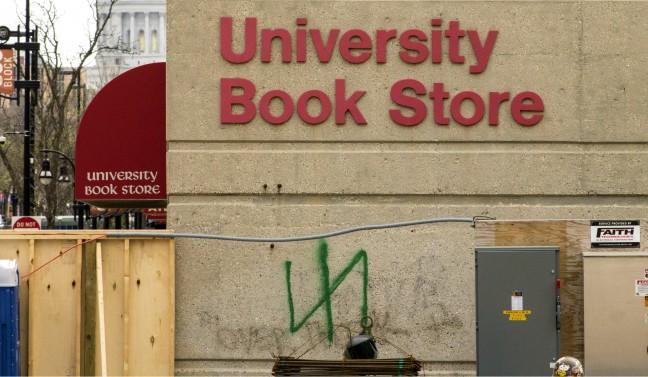Contemporary anti-Semitism has a strange, punctuated pattern of appearance in the American consciousness. It is rarely discussed as a free-standing issue, rather it is usually dealt with in the wake of something horrible. Events like the Pittsburgh shooting, the vandalism of a memorial outside a Madison synagogue or the harassment of a Jewish student with Nazi imagery are often followed with an explosion of op-eds, tweets and condemnations.
It’s the correct reaction, but it’s a limited one. With incidents of anti-Semitism popping up every few weeks on college campuses, it is essential to understand the origins of contemporary campus anti-Semitism and how it can be proactively confronted.
As anti-Semitic incidents increase across US, UW Hillel strives for unity, awareness
Let us start with the most recent case of Nazi-outing at the University of Wisconsin. Until October 2017, Dylan Bleier was a teaching assistant in the chemistry department. After his online anti-Semitism was revealed in an exhaustive investigative piece by CV Vitolo-Haddad, Bleier was relieved of his position. Vitolo-Haddad’s article outlined Bleier’s political radicalization, starting from his early quasi-liberal writings through a confused period of right-libertarianism into full-blown neo-Nazism.
The article is correct in its assertion that white supremacy and anti-Semitism are present across the political spectrum – that is to say, horrible anti-Semitic tropes, jokes or comments are still unfortunately common in our society. But that isn’t the whole story, and Bleier’s tale is instructive.
Letter to the Editor: Jews will not be defined by those who wish for their demise
The earliest evidence of anti-Semitism from Bleier was a series of flyers he distributed to professors back in his Oberlin College days, containing racist phrases and Nazi iconography. Bleier claimed the whole stunt was a misguided attempt at satire, but nevertheless, he faced disciplinary action from the college. The whole thing is strikingly similar to an incident in Sellery Hall two years ago when a student was disciplined for putting swastikas and images of Adolf Hitler on a Jewish student’s door – in what the student later claimed was a prank.
Both Bleier and the unknown Sellery student were disciplined, although it is unknown whether either received counseling. It is possible that these incidents were simply grotesque attempts at trolling and not calculated attempts at intimidating Jewish community members. In that case, education and restorative justice may help these students learn from their actions.
But that’s not where Bleier’s story ends. Because although anti-Semitism shows its wretched mug everywhere, it is only the far-right which sees these ugly incidents as recruiting opportunities, and as a base for political organization.
Conservatives’ self-victimization on college campuses is getting old
A tactic that has been in vogue for several years with these groups is the use of “free speech” as a rhetorical tool to entice potential recruits into anti-Semitic, racist and fascist politics.
When Bleier felt some sort of reprimand or consequence for what he thought of as “free speech” — in reality, a fairly comprehensive campaign of racist and anti-Semitic intimidation — alt-right groups were right there to whisper words of validation in his ear. From there, it was but a hop, skip and a jump to genuinely anti-Semitic politics. That is entrenched anti-Semitism, the kind that cannot be confronted with university-funded talks about respecting the lives of the marginalized. And the process is self-reinforcing — every political anti-Semite is a potential confidant and ideological guide for the next one.
It is the omnipresence of far-right groups online, and occasionally offline, that make anti-Semitism on campus a persistent and difficult enemy. Without confronting and struggling with the vast apparatus of far-right propaganda, students hoping to fight discrimination and create a safe environment for marginalized communities will find themselves playing Whack-A-Mole. With far-right groups like the Proud Boys — an organization known mostly for street brawling and neo-Nazi ties with whom Breier was organizing when he was fired — trying to establish a physical presence in Madison, the task is even harder. Anti-Semitic groups want to build infrastructure, to make themselves durable. It should be the primary job of everyone who wants Jewish members of the Madison family to feel safe in their own city to make that task impossible.
Hateful ideas cannot be defeated as ideas per se, but organizations that spread them can be. Anti-Semitism will not wither away on its own — it must be fought tooth and nail. To keep our campus safe, we must meet anti-Semitism in every place it takes root — online, in the dorms, in the lecture halls and in the streets.
Sam Palmer ([email protected]) is a senior majoring in biology.














